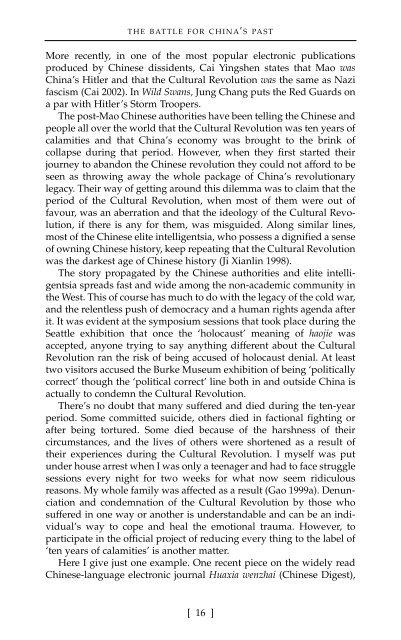Battle for China's Past : Mao and the Cultural Revolution
Battle for China's Past : Mao and the Cultural Revolution
Battle for China's Past : Mao and the Cultural Revolution
You also want an ePaper? Increase the reach of your titles
YUMPU automatically turns print PDFs into web optimized ePapers that Google loves.
THE BATTLE FOR CHINA’ S PAST<br />
More recently, in one of <strong>the</strong> most popular electronic publications<br />
produced by Chinese dissidents, Cai Yingshen states that <strong>Mao</strong> was<br />
China’s Hitler <strong>and</strong> that <strong>the</strong> <strong>Cultural</strong> <strong>Revolution</strong> was <strong>the</strong> same as Nazi<br />
fascism (Cai 2002). In Wild Swans, Jung Chang puts <strong>the</strong> Red Guards on<br />
a par with Hitler’s Storm Troopers.<br />
The post-<strong>Mao</strong> Chinese authorities have been telling <strong>the</strong> Chinese <strong>and</strong><br />
people all over <strong>the</strong> world that <strong>the</strong> <strong>Cultural</strong> <strong>Revolution</strong> was ten years of<br />
calamities <strong>and</strong> that China’s economy was brought to <strong>the</strong> brink of<br />
collapse during that period. However, when <strong>the</strong>y first started <strong>the</strong>ir<br />
journey to ab<strong>and</strong>on <strong>the</strong> Chinese revolution <strong>the</strong>y could not af<strong>for</strong>d to be<br />
seen as throwing away <strong>the</strong> whole package of China’s revolutionary<br />
legacy. Their way of getting around this dilemma was to claim that <strong>the</strong><br />
period of <strong>the</strong> <strong>Cultural</strong> <strong>Revolution</strong>, when most of <strong>the</strong>m were out of<br />
favour, was an aberration <strong>and</strong> that <strong>the</strong> ideology of <strong>the</strong> <strong>Cultural</strong> <strong>Revolution</strong>,<br />
if <strong>the</strong>re is any <strong>for</strong> <strong>the</strong>m, was misguided. Along similar lines,<br />
most of <strong>the</strong> Chinese elite intelligentsia, who possess a dignified a sense<br />
of owning Chinese history, keep repeating that <strong>the</strong> <strong>Cultural</strong> <strong>Revolution</strong><br />
was <strong>the</strong> darkest age of Chinese history (Ji Xianlin 1998).<br />
The story propagated by <strong>the</strong> Chinese authorities <strong>and</strong> elite intelligentsia<br />
spreads fast <strong>and</strong> wide among <strong>the</strong> non-academic community in<br />
<strong>the</strong> West. This of course has much to do with <strong>the</strong> legacy of <strong>the</strong> cold war,<br />
<strong>and</strong> <strong>the</strong> relentless push of democracy <strong>and</strong> a human rights agenda after<br />
it. It was evident at <strong>the</strong> symposium sessions that took place during <strong>the</strong><br />
Seattle exhibition that once <strong>the</strong> ‘holocaust’ meaning of haojie was<br />
accepted, anyone trying to say anything different about <strong>the</strong> <strong>Cultural</strong><br />
<strong>Revolution</strong> ran <strong>the</strong> risk of being accused of holocaust denial. At least<br />
two visitors accused <strong>the</strong> Burke Museum exhibition of being ‘politically<br />
correct’ though <strong>the</strong> ‘political correct’ line both in <strong>and</strong> outside China is<br />
actually to condemn <strong>the</strong> <strong>Cultural</strong> <strong>Revolution</strong>.<br />
There’s no doubt that many suffered <strong>and</strong> died during <strong>the</strong> ten-year<br />
period. Some committed suicide, o<strong>the</strong>rs died in factional fighting or<br />
after being tortured. Some died because of <strong>the</strong> harshness of <strong>the</strong>ir<br />
circumstances, <strong>and</strong> <strong>the</strong> lives of o<strong>the</strong>rs were shortened as a result of<br />
<strong>the</strong>ir experiences during <strong>the</strong> <strong>Cultural</strong> <strong>Revolution</strong>. I myself was put<br />
under house arrest when I was only a teenager <strong>and</strong> had to face struggle<br />
sessions every night <strong>for</strong> two weeks <strong>for</strong> what now seem ridiculous<br />
reasons. My whole family was affected as a result (Gao 1999a). Denunciation<br />
<strong>and</strong> condemnation of <strong>the</strong> <strong>Cultural</strong> <strong>Revolution</strong> by those who<br />
suffered in one way or ano<strong>the</strong>r is underst<strong>and</strong>able <strong>and</strong> can be an individual’s<br />
way to cope <strong>and</strong> heal <strong>the</strong> emotional trauma. However, to<br />
participate in <strong>the</strong> official project of reducing every thing to <strong>the</strong> label of<br />
‘ten years of calamities’ is ano<strong>the</strong>r matter.<br />
Here I give just one example. One recent piece on <strong>the</strong> widely read<br />
Chinese-language electronic journal Huaxia wenzhai (Chinese Digest),<br />
[ 16 ]
















